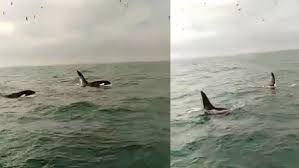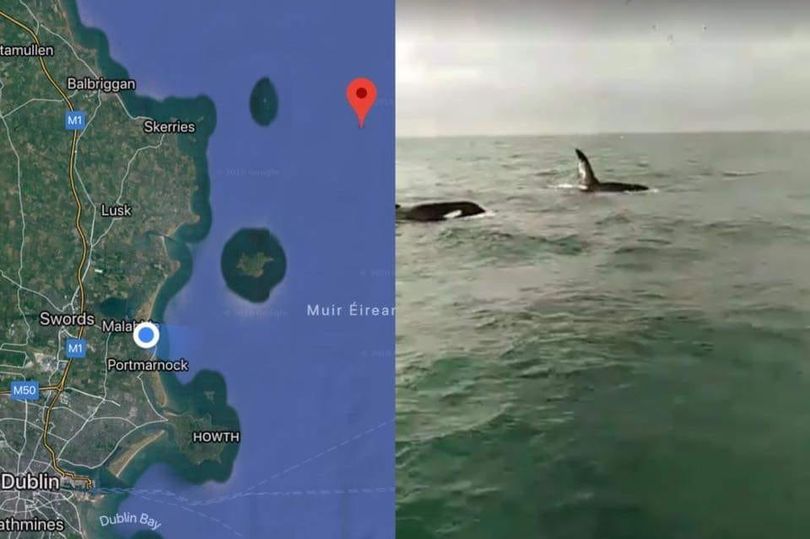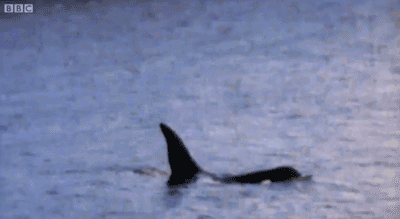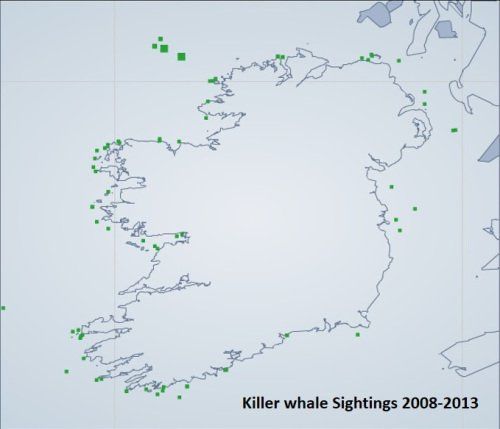Killer whales (Orcinus orca) sighted off the Dublin coast.
Killer whales (Orcinus orca) were spotted in the Irish Sea by commercial fishermen - 6 miles of Rockabill Island, Howth, Co. Dublin on Saturday the 17th of November, 2018.
The orca's, who are thought to be the regular visitors to Irish shores; "John Coe" and "Aquarius", were observed by John Leonard- Howth Shipwright and James Baxter, who maintain the whales were actively hunting seals.
Watch video below taken by fisherman James Baxter. (*Explicit language warning!)
"John Coe" was first photo-identified in Scotland in 1992 and these whales are likely from the Scottish West Coast Community which number at just 8 individuals. "Aquarius" was last seen with "John Coe" together in the Blasket Islands in Co. Kerry last March. The Scottish West Coast Community of killer whales have not produced a calf in more than two decades. The fishermen thought they saw "Dopey Dick", who was the first killer whale to be recorded in inshore Irish waters in 1977 in Lough Foyle, Co. Derry.
Dedicated research on killer whales has been the focus of P.h.D. candidate and chief scientist Róisín Pinfield, of University College Cork, who recently completed a survey of killer whales which visit our waters, travelling to the Shetland Isles with a team of UCC researchers; in a successful bid to catalogue these whales using photo-identification of the unique markings on individual's dorsal fins. Read their blog here: https://scientistsatsea.blogspot.com/2018/10/operation-orca-survey-killer-whale.html
Killer whales are one of the most widely distributed cetacean species occurring from pole to pole, but are to this day, one of the more severely threatened cetacean species.
A recent study published in the journal Science , has revealed that due to the exposure of Polychlorinated biphenyls (PCBs), which affects whale's fertility and immune function, noise and disturbance from boats and malnutrition from lack of food availability due to overfishing and dams, 50% of killer whale populations worldwide are under threat of population extinction within the next 30 to 40 years. The study also pointed out that the highest contaminants found in Killer whales were those analysed from whales close to industrialized areas, such as; the Strait of Gibraltar, the U.K and the North-east Pacific.
PCBs are man-made chemicals that were used commercially in paints and rubber products from 1929 to 1979- until their ban by the Environmental Protection Agency (EPA) due to high and dangerous levels of toxicity.
Although killer whales once thrived in all ocean basins of the world, it seems that today only populations in the less-contaminated waters of the Arctic and Antarctic can sustain growth.
Killer whales are sighted on occasion in Irish waters and have been reported to the Irish Whale and Dolphin (IWDG) over the last decade from the east, west and south coasts of Ireland. "John Coe", "Aquarius", "Dopey Dick","Floppy Fin" and "Nicola" are whales we are becoming more and more familiar with, as there have been numerous reports from citizen scientists around the coasts.
Back in March 2018, "John Coe" was sighted with another whale Aquarius by Nick Masset, IWDG, in the Blasket Islands, Co, Kerry. These whales were believed to be hunting seals. This would fit in-line with the "eco-type" of killer whale of "John Coe" - i.e. Type 2- North-east Atlantic, as they are mammal eaters, although it is minke whale ( Balaenoptera acutorostrata) they are thought to primarily prey upon. Read our blog "Orca's in Irish Oceans " here; https://www.orcireland.ie/orcas-in-irish-oceans.
Humans have long had a fascination with orca whales and we are gaining more knowledge of their behaviour every year. The most recent findings suggest killer whales display personality traits similar to those of humans and chimpanzees, such as playfulness, cheerfulness and affection. Read more at: https://www.orcireland.ie/killer-whales-share-personality-traits-with-chimpanzees-and-humans.
© Ocean Research & Conservation Ireland (ORCireland) and www.orcireland.ie , est. 2017. Unauthorized use and/or duplication of this material without express and written permission from this site’s author and/or owner is strictly prohibited. Excerpts and links may be used, provided that full and clear credit is given to Ocean Research & Conservation Ireland and www.orcireland.ie with appropriate and specific direction to the original content.
References:
Jepson, Paul & Deaville, Rob & Barber, Jon & Aguilar, Alex & Borrell, Asunción & Murphy, Sinéad & Barry, Jon & Brownlow, Andrew & Barnett, James & Berrow, Simon & Cunningham, Andrew & Davison, Nick & Ten Doeschate, Mariel & Esteban, Ruth & Ferreira, Marisa & D Foote, Andrew & Genov, Tilen & Giménez, Joan & Loveridge, Jan & Law, Robin. (2016). PCB pollution continues to impact populations of orcas and other dolphins in European waters. Scientific Reports. 6. PCB pollution continues to impact populations of orcas and other dolphins in European waters. 10.1038/srep18573.
SHARE THIS ARTICLE

















